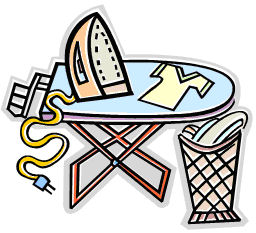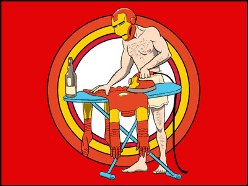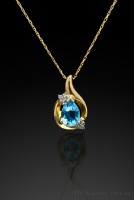Category: "Clothing"
Рубашка
The most common word for shirt in Russian in рубашка. It declines like this:
| Sg | Pl | |
| Nom | рубашка | рубашки |
| Acc | рубашку | |
| Gen | рубашки | рубашек |
| Pre | рубашке | рубашках |
| Dat | рубашкам | |
| Ins | рубашкой | рубашками |
When talking about shirts, one often discusses colors, styles, sleeve lengths and brands:
| Папа всегда носил рубашки с длинными рукавами. | Dad always worе long-sleeved shirts. |
| Мой брат любит носить рубашки Бугатчи. | My brother likes to wear Bugatchi shirts. |
| Боря сегодня в синей рубашке. | Boris is wearing a navy blue shirt today. |
| На Боре сегодня синяя рубашка. | Boris is wearing a navy blue shirt today. |
| Олег надел рубашку в полоску. | Oleg put on a striped shirt. |
| Олег оделся в чёрную рубашку. | Oleg put on a black shirt. |
| — Тань, ты не видела, какая у Жени сегодня рубашка? — Нет, какая? — Он в рубашке в горошек. — В горошек? Он что, с ума сошёл? — Ну, он вообще немного чокнутый. Но рубашка сама мне почему-то понравилась. — Ну, ты тоже с приветом. |
“Tanya, did you see what kind of shirt Evgeni is wearing today?” “No, what kind?” “He's wearing a polka-dot shirt?” “Polka dots? What, has he gone crazy?” “Well, he's kind of weird in general. But the shirt itself I liked for some reason.” “Well, you're a little odd, too.” |
Гладить/выгладить
Nobody likes chores. And everyone has that one chore they despise above all others. I would rather be tied to a chair and forced to watch reruns of “Barney and Friends” than iron clothing. Thank goodness I live in the century of electric dryers. The Russian word гладить means to iron or press.

| Imperfective | Perfective | |
| Infinitive | гладить | выгладить |
| Past | гладил гладила гладило гладили |
выгладил выгладила выгладило выгладили |
| Present | глажу гладишь гладит гладим гладите гладят |
No such thing as perfective present in Russian. |
| Future |
буду гладить будешь гладить будет гладить будем гладить будете гладить будут гладить |
выглажу выгладишь выгладит выгладим выгладите выгладят |
| Imperative | гладь(те) | выгладь(те) |
Я ненавижу гладить одежду.
I hate to iron clothes.
Что вы гладите?
What are you ironing?
Я глажу мою юбку.
I am ironing my skirt.
Железный человек гладил рабочую униформу.
Iron Man was ironing his work uniform.

http://www.tshirtbordello.com/Ironing-Man-T-Shirt
* Although гладить translates to iron it has nothing to do with the metal, iron. For that you would use железо.
Туфли (часть вторая)
One of the Russian words for shoe is туфля. Note the genitive plural:
| Sg | Pl | |
| Nom | туфля | туфли |
| Acc | туфлю | |
| Gen | туфли | туфель |
| Pre | туфле | туфлях |
| Dat | туфлям | |
| Ins | туфлей | туфлями |
The word is mostly used in the plural:
| Где мои туфли? | Where are my shoes? |
| После свержения Саддама Хусейна в 2003 году, было снято, как иракцы избивали его упавшую статую своими туфлями. (source) | After the overthrow of Saddam Hussein in 2003, Iraqis were caught on film beating his fallen statue with their shoes. |
| Ты собираешься пойти на работу в этих туфлях? Они такие старые, ты будешь очень непрофессионально выглядеть. | Are you planning on going to work in those shoes? They are so old. You are going to look very unprofessional. |
Of course, it is possible to use the word in the singular:
| Ёлки-палки, я потеряла туфлю. | Crud, I've misplaced a shoe. |
| Всё же позвали и Золушку. Примерили туфельку и — о, чудо! туфелька пришлась впору. Тогда Золушка достала из кармана вторую и надела ее, не говоря ни слова. (source) | Nonetheless they summoned Cinderella as well. They tried the shoe on her and — miraculously — it fight just right. Then Cinderella took the second one out of her pocket and put it on without saying a word. |
| Когда я сегодня обувался, в туфле был скорпион. Он меня больно укусил. | When I was putting on my shoes this moring, one of the shoes had a scorpion in it, and I got a nasty sting. |
| Какой туфлей (левой или правой) Хрущёв бил по столу в Америке? (source) | Which shoe (the left one or the right one) did Khrushchev pound the table with in America? |
Young women in Russia are much more likely to wear high-heeled shoes than their US counterparts. If a woman is young and sexy in Russia, then by heaven she is going to dress to kill. The picture below captures a commonplace: here are the feet of a lovely young woman next to the feet of her boyfriend.
It's funny, really. If ever there was a country where sensible shoes would be... well... sensible, it is Russia. There are cobblestone streets, dirt streets, uneven asphalt streets, and potholes the size of Kilauea, all of which can twist your ankle and break your leg at a moment's notice. Young Russian women conquer them all in high-heeled shoes.

Блузка, кофта
The most common words for blouse in Russian are кофта and блузка. The former is a perfectly second-declension noun, and the latter is affected by a spelling rule and has a fill vowel in the genitive plural:
| Sg | Pl | |
| Nom | блузка | блузки |
| Acc | блузку | |
| Gen | блузки | блузок |
| Pre | блузке | блузках |
| Dat | блузкам | |
| Ins | блузкой | блузками |
Some sample sentences:
| Таня сегодня одета в голубую блузку. | Tanya is dressed in a light-blue blouse today. |
| Оля надела шёлковую блузку. | Olya put on a silk blouse. |
| Зина сегодня в зелёной кофте. | Zina is wearing a green blouse today. |
| — Дочка, я не разрешу тебе выходить на улицу в блузке с таким декольте. — Но папа, она такая модная! — Нет, так не пойдёт. Неужели ты хочешь, чтобы все соседи думали, что ты легкомысленная? |
“Daughter, I will not let you go outside wearing a blouse with that décolletage.” “But Papa, it's so fashionable!” “No, that won't do at all. Do you really want all the neighbors to think that you are easy?” |
Russian Wikipedia makes the following statement:
| Кофта — предмет шерстяной вязаной одежды для верхней части тела с застёжкой снизу доверху спереди. Наличие застёжки — отличительный признак кофты. | A кофта is an item of clothing for the upper part of the body which is woven from wool and fastens on the front side from the bottom to the top. The fastener is the distinguishing characteristic of a кофта. |
I suppose theoretically that might be the case, but nowadays кофта is used fairly generically for a woman's top in casual conversation and is essentially the same thing as блузка. (Do a quick search for the word on images.google.com if you don't believe me.)
Last week when I googled кофта, I came across a slightly vulgar Russian poem about a blouse that had me rolling on the floor laughing my academic credentials off. It suddenly struck me that it would be a great opportunity for a little translation practice… or better yet, a translation contest! I quickly threw together an English version just to be sure it could be done effectively: yes, it can. So here we go:
Translation contest and rules
- Translate the poem into English.
- E-mail it to me using the contact link at the bottom of this page.
- All entries received by 11:59 p.m. on May 28th, 2010 will be considered.
- I will send $10 by regular mail to the person who sent me the version I judge to be the best translation.
- People from all countries are welcome to apply as long as you have a postal address to which I can send the $10 if you win.
- All entries will be posted to the web the first week of June so readers can compare translation tactics.
Кулон
 My grandmother used to have a big box of jewelry. It was always carefully placed on the second shelf of her armoire. When I was little, I loved playing with it, pretending I was an exotic princess. I have no idea why my grandmother trusted me with her little treasure box. Frankly, if I were her, I’d think a dozen times before letting me play with it; the fact that I never lost any of it could only be pure luck. There were so many nice, almost antique, pieces in there: earrings, rings, bracelets and beads. But what I liked the most was a tiny pendant with a blue rock and a golden setting. There was something so exquisite about it, my inner princess simply had to have it! After my grandmother passed away, my mom kept the jewelry box. I am not even sure what happened to it after we moved to the US. I have been trying to find a picture similar to the pendant I remember. The picture above somewhat resembles it but certainly doesn’t do it true justice.
My grandmother used to have a big box of jewelry. It was always carefully placed on the second shelf of her armoire. When I was little, I loved playing with it, pretending I was an exotic princess. I have no idea why my grandmother trusted me with her little treasure box. Frankly, if I were her, I’d think a dozen times before letting me play with it; the fact that I never lost any of it could only be pure luck. There were so many nice, almost antique, pieces in there: earrings, rings, bracelets and beads. But what I liked the most was a tiny pendant with a blue rock and a golden setting. There was something so exquisite about it, my inner princess simply had to have it! After my grandmother passed away, my mom kept the jewelry box. I am not even sure what happened to it after we moved to the US. I have been trying to find a picture similar to the pendant I remember. The picture above somewhat resembles it but certainly doesn’t do it true justice.
In Russian a pendant is кулон, which is a noun of masculine gender. Its diminutive is кулончик. In fact, if I were to talk about my grandmother’s pendant in Russian, I would most likely use кулончик to emphasize its small size as well as its fragility.
| Sg | Pl | |
| Nom | кулон | кулоны |
| Acc | ||
| Gen | кулона | кулонов |
| Pre | кулоне | кулонах |
| Dat | кулону | кулонам |
| Ins | кулоном | кулонами |
| Какая красивая цепочка! А кулончик вместе с ней продаётся? | What a beautiful chain! Do you sell the pendant with it? |
| В набор входят серьги, цепочка и кулон. | The set includes earrings, a chain and a pendant. |
| Смотри, какой кулончик мне Саша подарил! Он принадлежал его прабабушке! | Look, what a pendant Sasha gave me as a gift! It belonged to his great grandmother! |
| Мой Дима такой романтик! Вчера он мне подарил маленький кулончик в форме сердечка, в который он вложил наши фотографии! | My Dima is such a romantic! Yesterday he gave me a little pendant in a shape of a heart, which had our photos in it! |
| Сколько будет починить этот кулон? Видите, из него камушек выпадает. | How much would it be to fix this pendant? See, the gem is falling out. |